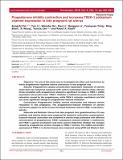| dc.contributor.author | Yin, Zongzhi | en_US |
| dc.contributor.author | Li, Yun | en_US |
| dc.contributor.author | He, Wenzhu | en_US |
| dc.contributor.author | Li, Dan | en_US |
| dc.contributor.author | Li, Hongyan | en_US |
| dc.contributor.author | Yang, Yuanyuan | en_US |
| dc.contributor.author | Shen, Bing | en_US |
| dc.contributor.author | Wang, Xi | en_US |
| dc.contributor.author | Cao, Yunxia | en_US |
| dc.contributor.author | Khalil, Raouf A. | en_US |
| dc.date.accessioned | 2018-03-20T16:01:01Z | |
| dc.date.issued | 2018 | en_US |
| dc.identifier.citation | Yin, Zongzhi, Yun Li, Wenzhu He, Dan Li, Hongyan Li, Yuanyuan Yang, Bing Shen, Xi Wang, Yunxia Cao, and Raouf A. Khalil. 2018. “Progesterone inhibits contraction and increases TREK-1 potassium channel expression in late pregnant rat uterus.” Oncotarget 9 (1): 651-661. doi:10.18632/oncotarget.23084. http://dx.doi.org/10.18632/oncotarget.23084. | en |
| dc.identifier.issn | | en |
| dc.identifier.uri | http://nrs.harvard.edu/urn-3:HUL.InstRepos:35014836 | |
| dc.description.abstract | Objective: The aim of this study was to investigate the effect and mechanism by which progesterone regulates uterine contraction in late pregnant rats Results: Progesterone caused concentration-dependent relaxation of uterine strips that was enhanced compared with control nontreated uterine strips. Uterine strips incubated with progesterone showed a significant increase in TREK-1 mRNA expression and protein level. TREK-1 inhibitor L-methionine partly reversed uterine relaxation caused by the progesterone, while TREK-1 activator arachidonic acid did not cause significant change in progesterone-induced relaxation. Conclusions: Progesterone inhibits uterine contraction and induces uterine relaxation in late pregnancy. The progesterone-induced inhibition of uterine contraction appears to partly involve increased potassium channel TREK-1 expression/activity. Materials and Methods Uterus from late-pregnant rats (gestational day 19) was isolated, and uterine strips were prepared for isometric contraction measurement. Oxytocin-induced contraction was compared in uterine strips pretreated with different concentration of progesterone. TREK-1 potassium channel inhibitor L-methionine and TREK-1 agonist arachidonic acid were used to determine whether the changes caused by progesterone involve changes in TREK-1 activity. The mRNA and protein expression of TREK-1 in uterine tissues were measured using qPCR and Western blot. | en |
| dc.language.iso | en_US | en |
| dc.publisher | Impact Journals LLC | en |
| dc.relation.isversionof | doi:10.18632/oncotarget.23084 | en |
| dc.relation.hasversion | http://www.ncbi.nlm.nih.gov/pmc/articles/PMC5787496/pdf/ | en |
| dash.license | LAA | en_US |
| dc.subject | pregnancy | en |
| dc.subject | uterine contraction | en |
| dc.subject | progesterone | en |
| dc.subject | TREK-1 channel | en |
| dc.title | Progesterone inhibits contraction and increases TREK-1 potassium channel expression in late pregnant rat uterus | en |
| dc.type | Journal Article | en_US |
| dc.description.version | Version of Record | en |
| dc.relation.journal | Oncotarget | en |
| dash.depositing.author | Khalil, Raouf A. | en_US |
| dc.date.available | 2018-03-20T16:01:01Z | |
| dc.identifier.doi | 10.18632/oncotarget.23084 | * |
| dash.authorsordered | false | |
| dash.contributor.affiliated | Khalil, Raouf | |


